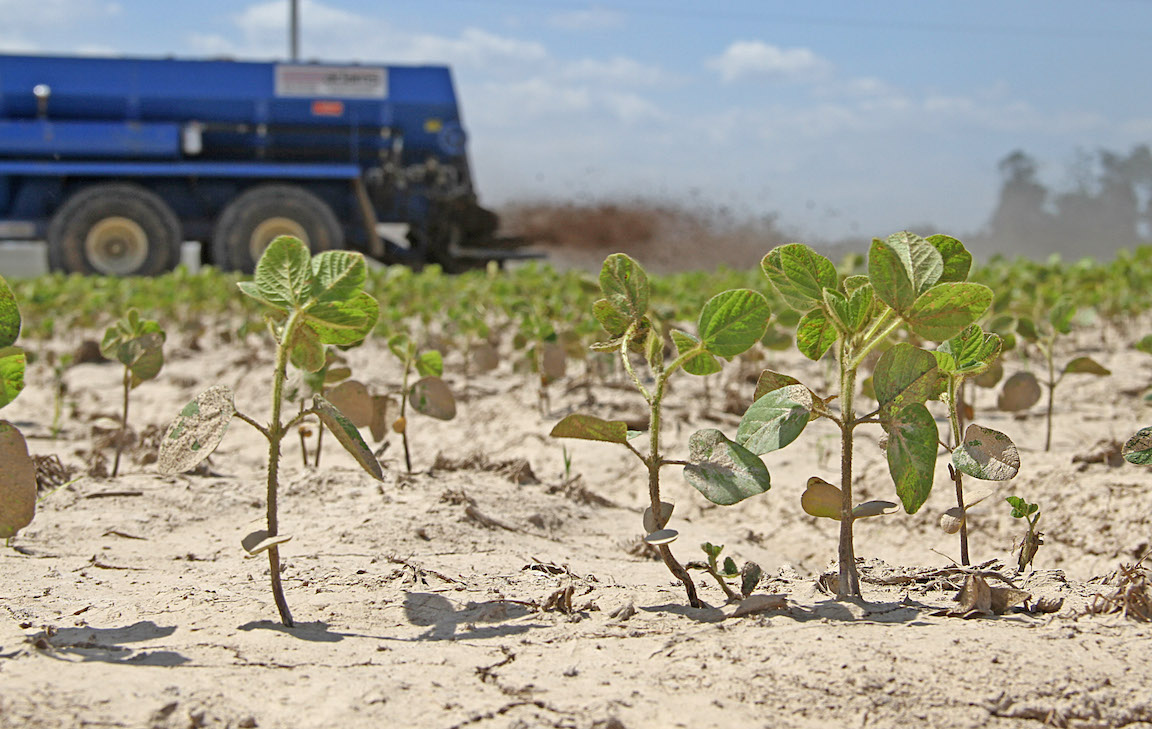Right to Farm: Tennessee Farmers Fight Chicken Litter Ban

Matt Griggs and Bubba Johnson smell hypocrisy. For the past 14 years, the Tennessee farmers have applied chicken litter to their row crops, but now face a local government ban on further applications, along with an environmental court summons.
“This is the elimination of a green practice because it is offensive to the very people who demand more sustainability,” Griggs says. “These same people would celebrate if I replaced chicken litter with 80 tons of synthetic fertilizer and blasted 240 tons of carbon in the air. How’s that for environmentally friendly?”
Big Red Barn
On Sept. 5, 2023, the city council of Jackson, Tenn., passed a motion (9-0) to outlaw chicken litter use on farmland within the city limits due to odor issues.
Fifth-generation producer Griggs grows corn, cotton, soybeans, and wheat in Madison and Crockett counties. Chicken litter is the backbone of his nutrient program, and 450 of his acres (30% of his total farmland) are within Jackson city limits.
“Jackson annexed my ground about 15 years ago, and subdivisions started going up and they continue building them today. The people in the city say they want green food, but they move out to the country and expect manicured fields and big red barn in the middle. The reality of farming is bugs, dust, and manure, and all I’m asking for is for folks to be reasonable.”
(Jackson city council’s main office did not respond to Farm Journal questions about the proposed chicken litter ban. Likewise, multiple city council members did not respond to Farm Journal questions.)
Griggs’ operation has long been at the vanguard of conservation, stewardship, and minimal inputs. The litter odor, he says, is a minimal nuisance. “We truck it in and the smell lasts about three days in summer. That means three days out of the entire year. On top of that, I’ve been using chicken litter since before these subdivisions arrived. What about my right to farm?”
Court Summons
Bubba Johnson grows soybeans in Madison County with roughly 400 acres inside Jackson city limits. For over a decade, Johnson has spread spring chicken litter, but in 2023, the weather delayed his hand. When wet conditions closed the spring application window, he applied litter in August—and got a call from a Jackson city representative.
“They told me my ground was putting out an ‘offensive odor’ and they were getting blown up at the mayor’s office with complaints, and that Jackson has an ‘offensive odor law’,” Johnson says.
In short time, Johnson received official notice in his mailbox: a misdemeanor summons to environmental court in October. “How political can you get?” he asks. “The city annexed my farmland. I never asked them to come. They then complain about a smell that will be gone in three to four days, but they don’t mind if I apply commercial fertilizer that comes from Russia or China. On top of that, the mayor’s office pretends this is about water quality. Ridiculous.”
The irony of complaints related to odor is particularly striking to Johnson, considering the city of Jackson claimed part of his family farm in the 1960s via eminent domain and built a sewer treatment plant. “It stunk—terribly. I smelled it regularly for 30 years and no one cared,” he describes. “Now, they annex my farmland, complain because it smells like chicken litter for three days, and take me to court.”
“They can hide behind all the political talk and fake green concerns all they want, but I know the law protects my right to farm.”
Grow Green?
Tennessee’s Right to Farm statute protects the use of chicken litter as a standard agricultural practice, Griggs and Johnson emphasize. As described in the statute: Farm operation means a condition or activity that occurs on a farm … and includes, but is not limited to: marketed produce at roadside stands or farm markets; noise; odors; dust; fumes; operation of machinery and irrigation pumps; ground and aerial seeding and spraying; the application of chemical fertilizers, conditioners, insecticides, pesticides, and herbicides …
“We use chicken litter and that’s about as natural as you can get,” Griggs notes. “I do things right on my farmland as part of the 2% of our population in production agriculture that lets the other 98% do the jobs they want to do. But the subdivision crowd and city people don’t realize they’re also involved in agriculture, because they eat food from farms.”
According to the Sept. 5, Jackson city council meeting, a $50 fine per day may be in play for farmers who use chicken litter. However, the financial penalty parameters were not defined. “Is it $50 per day for stockpiling? Is it $50 per day after spreading? Is it $50 per day while it smells? This is overreach by people that don’t understand how their food is grown,” Griggs says.
Speaking to WBBJ Television, Scott Conger, Jackson’s mayor, cited potential groundwater impacts related to chicken litter use. “We want to make sure we’re looking after all of our residents….and we’re looking into some environmental studies into what chicken manure can do to groundwater….we just want to make sure we’re providing an environment that is comfortable for people.”
The mayor’s remarks have no merit, Griggs contends. “That is called pure political speech. Annex ground, build subdivisions, and then claim the farmer who’s been using chicken litter for 14 years is polluting the water. And then pat yourself on the back because you want to force the farmer to replace the litter with 80 tons of chemicals.”
(Mayor Scott Conger’s office did not respond to Farm Journal questions about the proposed chicken litter ban. Tennessee Farm Bureau did not respond to Farm Journal questions about the proposed chicken litter ban. Tennessee Department of Agriculture declined comment.)
“Chicken litter is a natural fertilizer source that still allows for high yield production while minimizing synthetic fertilizer use—which is produced primarily in foreign countries, some of which may be hostile to the U.S.—and it should be embraced, not demonized,” Griggs adds.
“I’m not against progress,” Johnson echoes. “I’m in the dirt business and we build pads, and I understand change, but please, I’m just asking for sensibility. The same people who love to talk about organic food are upset over organic fertilizer near their subdivision.”
Jackson’s next city council meeting is scheduled for Oct. 3, where Griggs intends to address the panel. “I urge everyone to speak up. No matter where you are in the country, pay attention to this, because what is local for me will be in your community tomorrow.”
“Reason and tolerance go out the window fast, and farmers get hammered by government when the facts get brushed aside in favor of emotion,” Griggs adds. “We’re up against a mindset where elites say, ‘You better grow green, but you better not grow green in my backyard.’”
For more from Chris Bennett (cbennett@farmjournal.com 662-592-1106) see:
Priceless Pistol Found After Decades Lost in Farmhouse Attic
Cottonmouth Farmer: The Insane Tale of a Buck-Wild Scheme to Corner the Snake Venom Market
Tractorcade: How an Epic Convoy and Legendary Farmer Army Shook Washington, D.C.
Bagging the Tomato King: The Insane Hunt for Agriculture’s Wildest Con Man
Young Farmer uses YouTube and Video Games to Buy $1.8M Land
While America Slept, China Stole the Farm
Bizarre Mystery of Mummified Coon Dog Solved After 40 Years
The Arrowhead whisperer: Stunning Indian Artifact Collection Found on Farmland
Fleecing the Farm: How a Fake Crop Fueled a Bizarre $25 Million Ag Scam
Skeleton In the Walls: Mysterious Arkansas Farmhouse Hides Civil War History
US Farming Loses the King of Combines
Ghost in the House: A Forgotten American Farming Tragedy
Rat Hunting with the Dogs of War, Farming's Greatest Show on Legs
Evil Grain: The Wild Tale of History’s Biggest Crop Insurance Scam









